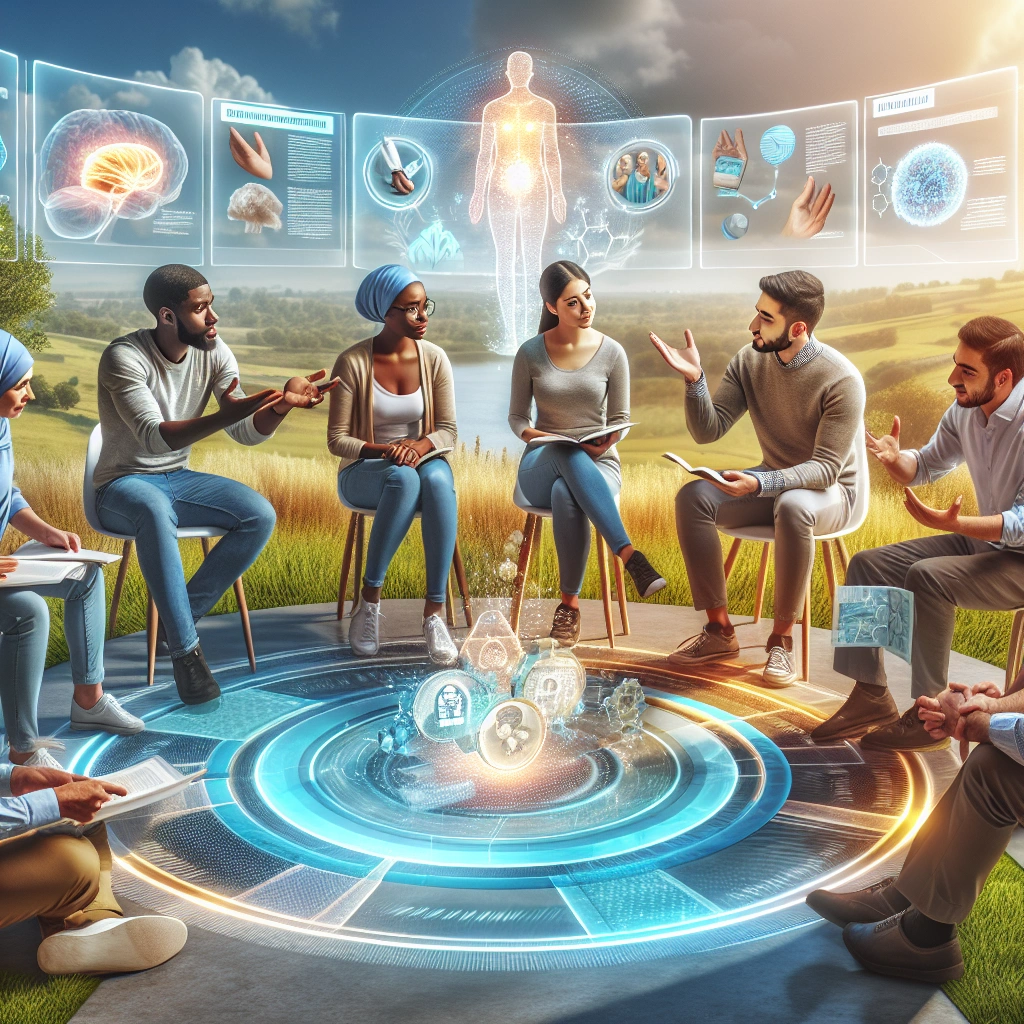What Is The Importance Of Debunking Health Misinformation Statistics: The Truth About Online Health Claims


Health misinformation statistics are crucial in understanding the prevalence and impact of false or misleading health information. Debunking health misinformation statistics is important for providing accurate and reliable information to the public.
It helps to counter the spread of false information and reduces the potential harm caused by misinformation on public health.
The impact of health misinformation on public health can be significant, leading to vaccine hesitancy, rejection of public health measures, and the use of unproven treatments. Debunking health misinformation statistics is essential in addressing these negative effects and promoting evidence-based healthcare practices.
By providing accurate information, healthcare providers and organizations can help mitigate the spread of misinformation and its adverse impact on public health.
Health misinformation can contribute to confusion, mistrust, and harm to individuals’ health. Debunking health misinformation statistics plays a critical role in combating these negative outcomes and supporting public health efforts.
By addressing and correcting false information, debunking health misinformation statistics helps to promote trust in healthcare authorities, encourage vaccination, and ultimately protect the well-being of the public.
Check out this Youtube video: Learn about the importance of debunking health misinformation statistics and see how Viral Facts is working to stop the spread of false information.
The Spread of Health Misinformation
The rise of online health claims
The rise of online health claims has been fueled by the widespread accessibility of information on the internet, allowing individuals to seek out health-related information without consulting professionals. This has led to a surge in self-diagnosis and self-treatment, often based on unverified sources and anecdotal evidence.
Virality of inaccurate health information
The virality of inaccurate health information is a growing concern, as false claims and unproven remedies can spread rapidly through social media and online communities. This misinformation can significantly impact public health, leading to misguided decisions about treatments, vaccines, and lifestyle choices.
Consequences of Health Misinformation
Health misinformation has a significant impact on personal health decisions, leading individuals to make choices based on false, inaccurate, or misleading information. This can result in people opting for unproven treatments or rejecting established public health measures, ultimately leading to negative consequences for their well-being.
Furthermore, health misinformation has a substantial influence on public health policies. It can contribute to vaccine hesitancy, resistance to public health guidelines, and the propagation of unverified healthcare practices.
As a result, it becomes challenging for authorities to implement effective public health strategies when misinformation perpetuates skepticism and uncertainty.
The Importance of Debunking Health Misinformation
Restoring public trust in accurate health information is crucial for ensuring that individuals make informed decisions about their well-being. Misinformation can lead to skepticism and confusion, undermining confidence in reliable health guidance.
Protecting vulnerable populations from harmful misinformation is essential to prevent them from falling prey to unproven treatments or practices that could endanger their health. It’s imperative to shield those who may be more susceptible to believing false information due to their circumstances or lack of access to accurate health resources.
Identifying Health Misinformation
The common types of health misinformation
- False Claims: Inaccurate statements about the effectiveness of certain treatments or products.
- Misleading Testimonials: Biased or manipulated personal stories promoting health remedies.
- Conspiracy Theories: Unsubstantiated explanations for health-related events or phenomena.
How to recognize inaccurate health claims
- Verify Sources: Check the credibility of the source and look for scientific evidence to back the claims.
- Consult Experts: Seek guidance from qualified health professionals to validate the accuracy of health information.
- Fact-Check: Use reputable fact-checking sites to confirm the authenticity of health claims before believing or sharing them.
Debunking Strategies
Providing evidence-based information
It is crucial to provide evidence-based information in debunking health misinformation statistics. This involves presenting facts, scientific studies, and credible research that support the accurate health information.
By relying on evidence, we can dismantle false claims and help individuals make informed decisions about their health.
Using credible sources to counter health misinformation
Using credible sources is essential in countering health misinformation. Reliable sources such as government health agencies, medical institutions, and peer-reviewed journals can provide trustworthy information to debunk false health claims.
By referencing credible sources, we can establish the validity of the information and combat the spread of misinformation in the health domain.
Building Trust and Credibility
The role of healthcare professionals in debunking health misinformation is crucial in fostering trust among the public. By actively engaging in the dissemination of accurate information and addressing prevalent misconceptions, healthcare professionals not only uphold their credibility but also play a decisive role in combating widespread misinformation.
Their efforts in debunking health misinformation contribute significantly to building trust and confidence in healthcare institutions and professionals.
Importance of transparency and honesty in health communication cannot be overstated. Transparent and honest communication fosters trust among patients and the community, leading to improved healthcare outcomes.
It ensures that patients are well-informed, enabling them to make better decisions about their health. Moreover, transparency during public health emergencies is essential for effective management and instills confidence in the healthcare system’s ability to handle crises.
By prioritizing honesty and transparency in health communication, healthcare institutions can establish themselves as trustworthy and credible entities.
| Healthcare Professionals | Health Communication |
|---|---|
| Actively debunk misinformation | Foster trust among patients |
| Combat misinformation | Improve healthcare outcomes |
| Uphold credibility | Prioritize honesty and transparency |
This table illustrates the critical actions and outcomes associated with the roles of healthcare professionals and the importance of transparency and honesty in combating health misinformation and improving healthcare communication.
The Role of Social Media
Addressing health misinformation on popular social media platforms
The role of social media in addressing health misinformation is crucial. It provides a platform for spreading accurate information to counteract false claims.
By actively monitoring and fact-checking health-related content, these platforms can take down misinformation and prevent its spread to protect public health.
Social media platforms can implement algorithms to detect and flag potentially misleading health content for further review. Additionally, they can work with reputable health organizations and fact-checkers to ensure that accurate information is prioritized and easily accessible to users.
This proactive approach can significantly reduce the dissemination of misinformation.
Moreover, social media platforms can offer educational resources to users to promote media literacy and critical thinking, enabling them to identify and question potentially misleading health information. By empowering users with the tools to discern fact from fiction, social media can effectively combat health misinformation.
Addressing health misinformation on popular social media platforms is vital for safeguarding public health and promoting accurate, evidence-based information to the masses. With proactive measures and collaboration with experts, social media platforms can play a pivotal role in debunking health misinformation and ensuring the dissemination of reliable health information.
Educational Campaigns
The impact of public health campaigns in debunking health misinformation
Public health campaigns play a crucial role in debunking health misinformation by disseminating accurate information to the masses. These campaigns utilize various media channels and platforms to reach the public and correct any misleading information.
For instance, during the recent global pandemic, public health campaigns have been instrumental in educating communities about the virus, transmission, and vaccination, dispelling myths and misinformation. By providing accurate and reliable information, public health campaigns can effectively combat the spread of false health information and ensure the public’s well-being.
Promoting media literacy to empower individuals in evaluating health information
Empowering individuals with media literacy skills is vital in enabling them to critically evaluate health information. Media literacy campaigns educate individuals on how to discern reliable sources from misinformation, enabling them to make informed decisions about their health.
These campaigns can involve workshops, informational materials, and online resources to teach individuals how to identify, analyze, and assess the credibility of health information they encounter. By promoting media literacy, individuals become better equipped to navigate the abundance of health information available, reducing the susceptibility to false or misleading claims.
| Media Literacy Benefits | Example |
|---|---|
| Enhances critical thinking skills | By teaching individuals to question and analyze media |
| Empowers informed decision-making | Allowing individuals to assess health information wisely |
Educational campaigns are pivotal in addressing and debunking health misinformation. By leveraging public health campaigns and promoting media literacy, society can equip individuals with the necessary tools to navigate the vast landscape of health information, ensuring they make informed decisions for their well-being.
Ethical Considerations
Balancing freedom of speech with health misinformation
It’s crucial to balance freedom of speech with addressing health misinformation. While freedom of speech is a fundamental right, the spread of health misinformation can have detrimental consequences on public health and safety.
Therefore, finding a balance that allows for open dialogue while combating false information is essential.
The responsibility of media outlets in preventing the spread of health misinformation
Media outlets play a significant role in preventing the spread of health misinformation. They have the responsibility to fact-check information before disseminating it to the public.
Additionally, media outlets should prioritize the promotion of verified, evidence-based health information to ensure the public is well-informed and protected from harmful misinformation.
Legal and Regulatory Measures
The role of government regulations in addressing health misinformation is crucial for protecting public health. Government bodies can enforce strict guidelines and penalties to prevent the spread of false health information, thereby safeguarding the well-being of citizens.
By implementing clear policies and regulations, governments can create a framework that discourages the dissemination of health misinformation, ensuring that accurate and trustworthy information takes precedence.
Holding accountable individuals and organizations spreading false health information is essential in combatting the proliferation of misinformation. By imposing legal consequences on those who intentionally spread false health information, it serves as a deterrent and encourages responsible sharing of accurate health-related details.
This accountability can help in mitigating the negative impact of misinformation on public health and promoting a culture of integrity and reliability in health communication.
Collaborative Efforts
In today’s era of widespread health misinformation, building partnerships between public health organizations, media, and technology companies holds paramount importance. These collaborations facilitate the dissemination of accurate health information and counter the rampant spread of false information. When these entities come together, they form a formidable force that combats misleading data and ensures that the public receives authentic health-related content. Through joint efforts, they can leverage their respective strengths to create a more reliable and credible information ecosystem.
Additionally, creating a united front against health misinformation is crucial to safeguarding public health. By working together, these organizations can implement cohesive strategies to identify and refute false claims effectively. This unified approach bolsters the credibility of health information and encourages individuals to make informed decisions about their well-being. Moreover, it fosters a sense of trust in the information circulated, ultimately empowering individuals to take charge of their health with confidence.
In essence, collaborative efforts between public health organizations, media, and technology companies serve as bulwarks against the deluge of health misinformation, fortifying the public with accurate and trustworthy information. Through these partnerships, a robust defense is established, ensuring that individuals can access reliable health-related content, thereby contributing to the overall well-being of communities.
The Impact on Global Health
Health misinformation affects different regions and communities by creating confusion and mistrust in healthcare systems, leading to delays in seeking medical help and contributing to the spread of illnesses. In some regions, misinformation has fueled vaccine hesitancy, impacting immunization rates and leaving communities vulnerable to preventable diseases.
Addressing cultural and language barriers in debunking health misinformation is crucial to ensure accurate information reaches all communities. Cultural nuances and language differences can lead to misinterpretation of health guidance, hindering the effective communication of crucial health information.
Tailoring debunking efforts to be culturally sensitive and available in multiple languages is essential for combating health misinformation globally.
Public Perception and Attitudes
People often believe in health misinformation due to fear, confusion, and a lack of trust in traditional health institutions. Misinformation preys on these vulnerabilities, creating a sense of urgency and a desire for easy solutions.
This can lead individuals to accept harmful myths, undermining their ability to make informed health decisions.
Attitudes towards health information and sources are changing with the advent of social media and online platforms. People now have access to a plethora of information, but not all sources are reliable.
The challenge lies in educating the public about critical evaluation of health information and promoting trust in credible sources.
| Reasons Behind Belief in Health Misinformation | Changing Attitudes Towards Health Information and Sources |
|---|---|
| Fear, confusion, and lack of trust | Impact of social media and online platforms |
| Urgency for easy solutions | Importance of critical evaluation and trust |
| Vulnerability to harmful myths | Promotion of credible sources and education |
By enhancing health literacy and promoting critical evaluation of information, we can combat the spread of health misinformation, helping individuals make well-informed decisions for their well-being.
Debunking in the Age of COVID-19
During the pandemic, there have been numerous instances of health misinformation, contributing to fear and confusion. Some examples include false claims about the association of face masks with CO2 toxicity and conspiracy theories regarding prominent figures like Bill Gates.
These misleading narratives have led to declining vaccine acceptance, rejection of public health measures, and the use of unproven treatments, impacting both mental and physical health.
Examples of health misinformation during the pandemic
Instances of misinformation regarding COVID-19 have led to increased psychological distress among healthcare workers, with over 70% reporting symptoms like anxiety, depression, and insomnia. The constant circulation of conflicting and confusing information has exacerbated these effects, highlighting the critical need to address and counteract misinformation.
Efforts to debunk COVID-19 related health misinformation
Organized efforts to debunk COVID-19 misinformation have been implemented, including passive inoculation, where people are educated about the misinformation before being exposed to it. Debunking, user correction, accuracy prompts, and warning labels have also been utilized to counter falsehoods.
These efforts are crucial in combatting the spread of misinformation and promoting public health.
Addressing Misinformation Fatigue
Strategies to combat misinformation fatigue
To combat misinformation fatigue, it is crucial to prioritize media literacy and critical thinking skills. By educating individuals on how to discern credible sources from misinformation, we empower them to challenge false narratives and reduce the spread of health misinformation.
Encouraging ongoing vigilance in debunking health misinformation
Encouraging ongoing vigilance in debunking health misinformation involves fostering a culture of fact-checking and accountability. By promoting transparent communication and continuous verification of health information, we instill a sense of responsibility in the community to actively debunk and counter false health narratives.
Recommended Amazon Products for Debunking Health Misinformation
Here’s a curated list of products that can help you debunk health misinformation with ease. These recommendations are based on their relevance to providing evidence-based information and credibility in health communication.
Apple iPad
The Apple iPad provides a portable and user-friendly platform for accessing and sharing evidence-based health information. With its large screen and powerful capabilities, it enables healthcare professionals to present factual data to counter health misinformation effectively.
Fitbit Charge 4
The Fitbit Charge 4 fitness tracker is a valuable tool for promoting media literacy and empowering individuals in evaluating health information. It encourages users to engage in physical activity and adopt healthy lifestyle choices, contributing to a better understanding of accurate health information.
Weber Instant-Read Thermometer
The Weber Instant-Read Thermometer is not only a practical kitchen tool for cooking, but it also symbolizes the importance of transparency and honesty in health communication. By emphasizing the use of precise measurements in food safety, it parallels the need for factual and accurate health information.
Blue Light Blocking Glasses
Blue light blocking glasses are essential for addressing misinformation fatigue by reducing eye strain and improving sleep quality. Through this, individuals can combat fatigue and remain vigilant in discerning credible health information.
Waterpik Water Flosser
The Waterpik Water Flosser promotes the importance of personal health decisions by emphasizing the value of oral hygiene. It serves as a reminder of the need for evidence-based practices and empowers individuals to prioritize their overall well-being.
Top Recommended Product for Debunking Health Misinformation
If you’re looking for the best solution for debunking health misinformation, we highly recommend the Apple iPad. Here’s why:


| Pros | Cons |
|---|---|
| User-friendly interface | Higher price point |
| Large screen for effective presentation | Potential for overreliance on technology |
| Seamless access to evidence-based information | Limited durability |
Ready to improve your debunking efforts? Check out the Apple iPad today for the best results!


Conclusion
Debunking health misinformation statistics is crucial for ensuring that the public receives accurate and reliable information about their health. By debunking false information, individuals can make informed decisions about their healthcare, leading to better outcomes and improved well-being.
Moreover, healthcare professionals play a vital role in debunking health misinformation statistics by providing accurate information to their patients and the public. They can help educate individuals about the dangers of misinformation and empower them to seek out reliable sources of health information.
Additionally, policymakers have a responsibility to address health misinformation by implementing regulations and initiatives that promote accurate health information. By supporting efforts to debunk health misinformation, policymakers can help protect the public from harmful misinformation and promote the overall health of the population.






